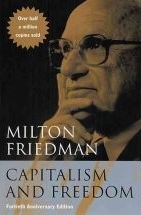by Milton Friedman
University
Of Chicago Press, 2002. 230 pages. Nonfiction
Originally published in 1962, this book serves as a
foundational piece in economic literature. Capitalism
and Freedom argues primarily that the former is a prerequisite for the
former; starting with two broad chapters about economic theory and liberty,
Friedman progresses to tackle in brief specific areas of American economic and
social policy and makes a case for the problems caused by interventionism and
how the free market can solve them. While confident in economic analysis,
Friedman acknowledges his limited frame of reference, a refreshing trait in a
Nobel Prize winning expert. His chapter on education was particularly
enjoyable, as he opens with the caveat that he is not an expert in any way on
education, but then makes predictions and suggestions that are both accurate
and relevant for society in the new millennium.
Capitalism
and Freedom walks the line between primer and textbook;
while not an introductory work on economics (Friedman does his best to simplify
theories and terms for the lay-reader, but assumes a basic knowledge), it also
avoids getting bogged down into minutia and complex equations. Where more in-depth
questions arise, Friedman clarifies his point and directs the inquisitive reader
towards specialized works where authors (including him) have done and explain
more detailed research. I would recommend this book for anyone who wants to learn
more about economics but doesn’t want to wrestle with equations.
JMS

1 comment:
I really enjoyed reading Friedman's book; it was especially fun to discuss his views on education with family members involved in the educational field. I've noticed based on other reviews that complaints and praise seem to be directly proportional to how Friedman's views correspond with the reader. While I disagreed with him on several topics, I still felt like I was forced to truly think about my opinions, which to me is a sign of well reasoned and consistent thought on his part.
Post a Comment